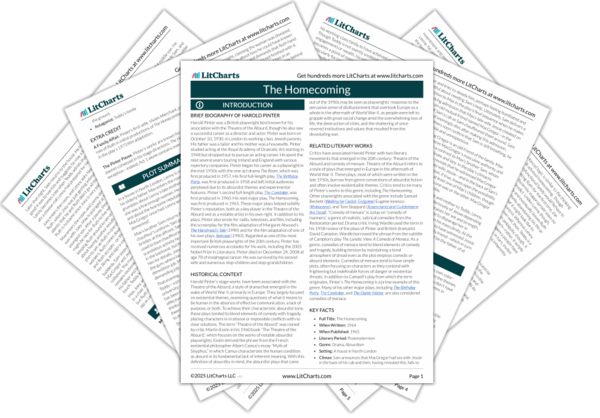Resentment
Harold Pinter’s sparse two-act play begins with the titular homecoming of Teddy, a British philosophy professor who after years living abroad in America visits his family home in London to introduce his wife, Ruth, to his family. Ruth is only meeting Teddy’s family now, despite the fact that she and Teddy have been married for six years. Teddy intends for the visit to be short and uneventful—he and Ruth have been touring Europe…
read analysis of ResentmentMeaning, Control, and Agency
Pinter’s The Homecoming spotlights the absurd ways in which people often try to gain a sense of control over life. By creating a general atmosphere of uncertainty and absurdity, the play casts this desire for control as futile, ultimately challenging the human impulse to superimpose logic or meaning onto an otherwise disorienting world.
Throughout the play, the characters frequently try to create various frameworks to help them both maintain and justify their worldviews. During Lenny…
read analysis of Meaning, Control, and AgencyPower
When eldest son Teddy pays his family a surprise visit, his unexpected return home disrupts the household’s equilibrium, throwing a wrench in the family’s established power dynamics and stoking tension and conflict among an already dysfunctional group of people. At its core, then, The Homecoming is deeply concerned with the nature of power—how a person gains and maintains power, and how the pursuit of power impacts a person’s relationships with others. Teddy’s unexpected visit to…
read analysis of Power
Sex and Gender Roles
Throughout The Homecoming, the play’s majority-male cast repeatedly uses crude, violent, often misogynistic language to show dominance over other characters. Max repeatedly references his past work as a butcher, implicitly casting the violent, bloody nature of the job as evidence of his masculinity and physical prowess. He pointedly emphasizes the masculine physicality of his former job to show dominance over his brother Sam, whose work as a cab driver Max derides because of…
read analysis of Sex and Gender Roles






